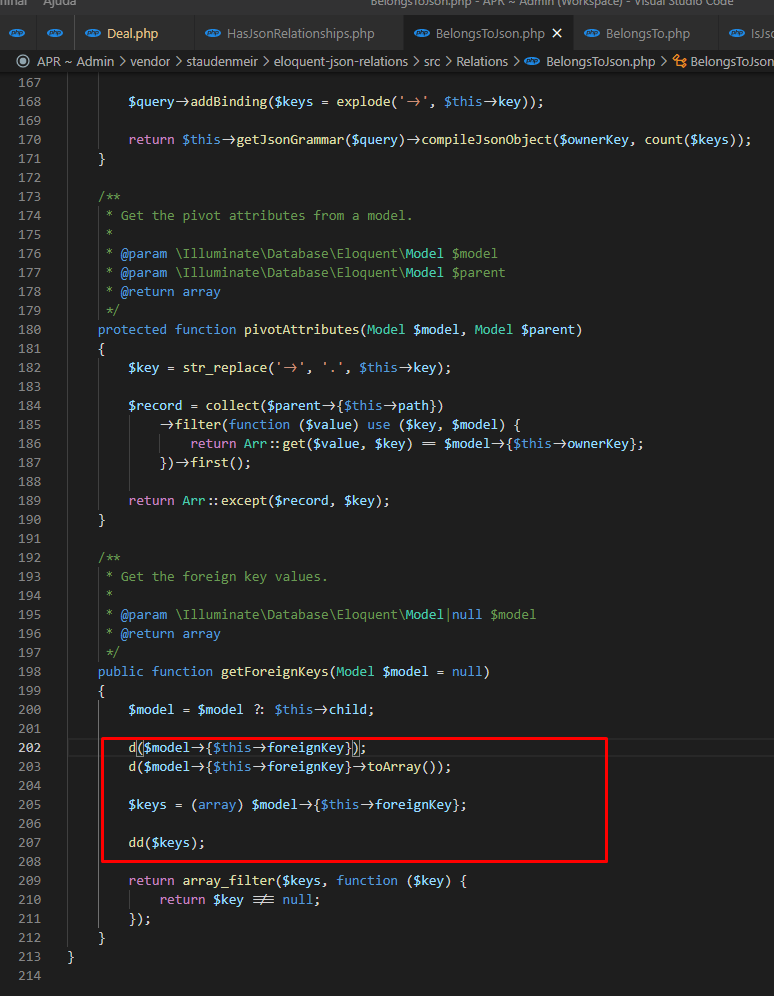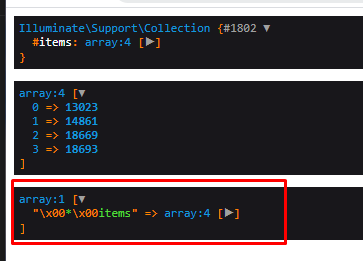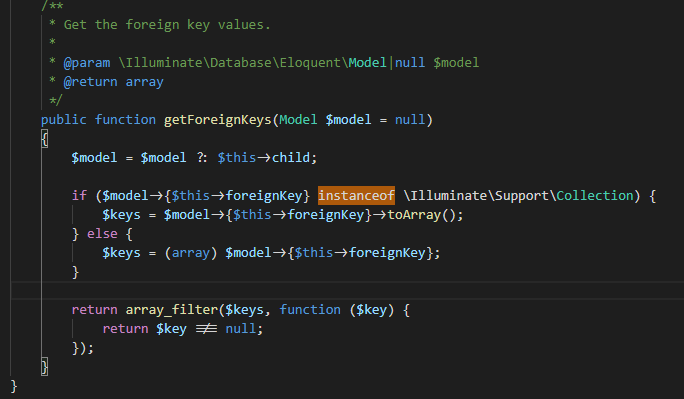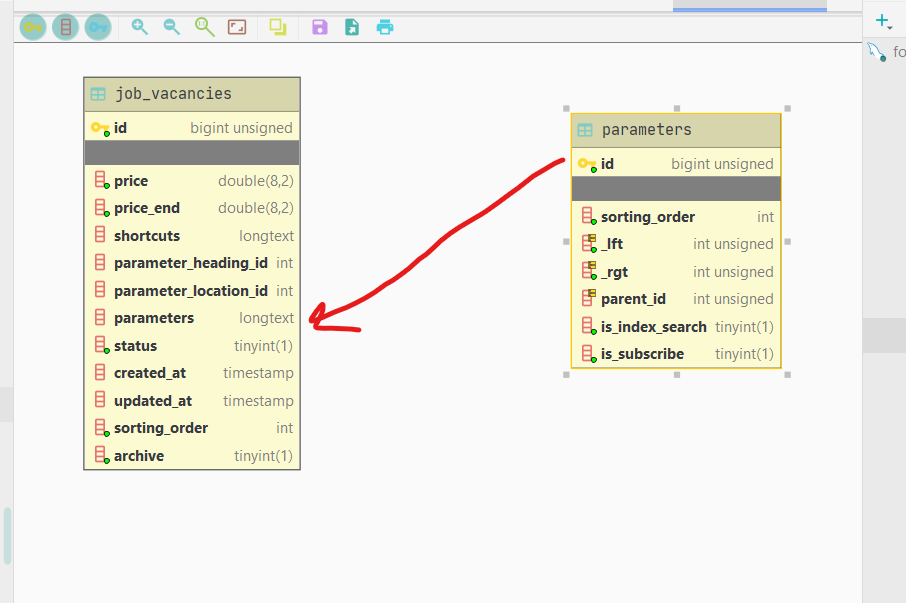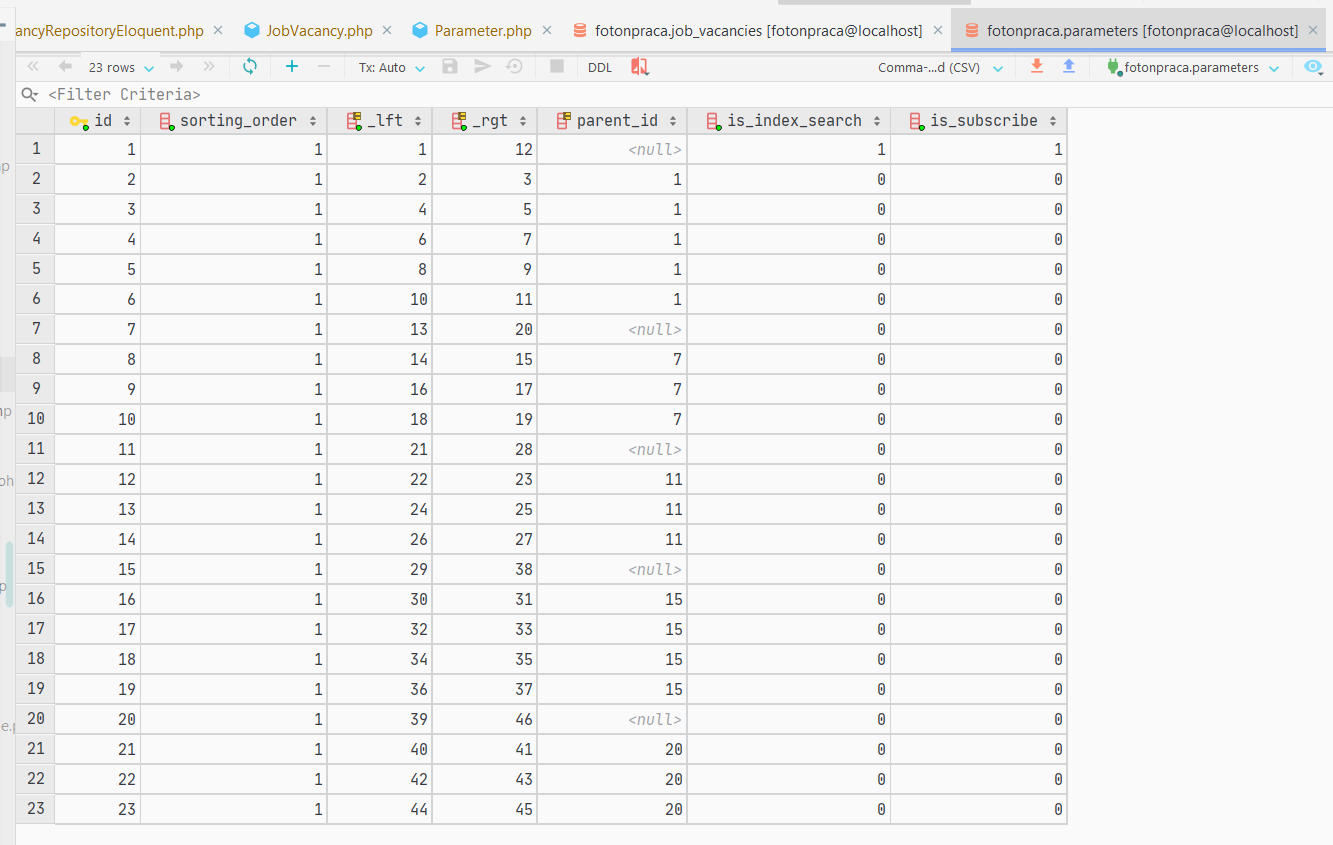This Laravel Eloquent extension adds support for JSON foreign keys to BelongsTo, HasOne, HasMany, HasOneThrough
, HasManyThrough, MorphTo, MorphOne and MorphMany relationships.
It also provides many-to-many and has-many-through relationships with JSON arrays.
- MySQL 5.7+
- MariaDB 10.2+
- PostgreSQL 9.3+
- SQLite 3.38+
- SQL Server 2016+
composer require "staudenmeir/eloquent-json-relations:^1.1"
Use this command if you are in PowerShell on Windows (e.g. in VS Code):
composer require "staudenmeir/eloquent-json-relations:^^^^1.1"
| Laravel | Package |
|---|---|
| 11.x | 1.11 |
| 10.x | 1.8 |
| 9.x | 1.7 |
| 8.x | 1.6 |
| 7.x | 1.5 |
| 6.x | 1.4 |
| 5.8 | 1.3 |
| 5.5–5.7 | 1.2 |
- One-To-Many Relationships
- Many-To-Many Relationships
- Has-Many-Through Relationships
- Deep Relationship Concatenation
In this example, User has a BelongsTo relationship with Locale. There is no dedicated column, but the foreign
key (locale_id) is stored as a property in a JSON field (users.options):
class User extends Model
{
use \Staudenmeir\EloquentJsonRelations\HasJsonRelationships;
protected $casts = [
'options' => 'json',
];
public function locale()
{
return $this->belongsTo(Locale::class, 'options->locale_id');
}
}
class Locale extends Model
{
use \Staudenmeir\EloquentJsonRelations\HasJsonRelationships;
public function users()
{
return $this->hasMany(User::class, 'options->locale_id');
}
}Remember to use the HasJsonRelationships trait in both the parent and the related model.
On MySQL , MariaDB and SQL Server you can still ensure referential integrity with foreign keys on generated/computed columns.
Laravel migrations support this feature on MySQL/MariaDB:
Schema::create('users', function (Blueprint $table) {
$table->bigIncrements('id');
$table->json('options');
$locale_id = DB::connection()->getQueryGrammar()->wrap('options->locale_id');
$table->unsignedBigInteger('locale_id')->storedAs($locale_id);
$table->foreign('locale_id')->references('id')->on('locales');
});Laravel migrations (5.7.25+) also support this feature on SQL Server:
Schema::create('users', function (Blueprint $table) {
$table->bigIncrements('id');
$table->json('options');
$locale_id = DB::connection()->getQueryGrammar()->wrap('options->locale_id');
$locale_id = 'CAST('.$locale_id.' AS INT)';
$table->computed('locale_id', $locale_id)->persisted();
$table->foreign('locale_id')->references('id')->on('locales');
});There is a workaround for older versions of Laravel.
The package also introduces two new relationship types: BelongsToJson and HasManyJson
Use them to implement many-to-many relationships with JSON arrays.
In this example, User has a BelongsToMany relationship with Role. There is no pivot table, but the foreign keys
are stored as an array in a JSON field (users.options):
By default, the relationship stores pivot records as an array of IDs:
class User extends Model
{
use \Staudenmeir\EloquentJsonRelations\HasJsonRelationships;
protected $casts = [
'options' => 'json',
];
public function roles()
{
return $this->belongsToJson(Role::class, 'options->role_ids');
}
}
class Role extends Model
{
use \Staudenmeir\EloquentJsonRelations\HasJsonRelationships;
public function users()
{
return $this->hasManyJson(User::class, 'options->role_ids');
}
}On the side of the BelongsToJson relationship, you can use attach(), detach(), sync() and toggle():
$user = new User;
$user->roles()->attach([1, 2])->save(); // Now: [1, 2]
$user->roles()->detach([2])->save(); // Now: [1]
$user->roles()->sync([1, 3])->save(); // Now: [1, 3]
$user->roles()->toggle([2, 3])->save(); // Now: [1, 2]You can also store pivot records as objects with additional attributes:
class User extends Model
{
use \Staudenmeir\EloquentJsonRelations\HasJsonRelationships;
protected $casts = [
'options' => 'json',
];
public function roles()
{
return $this->belongsToJson(Role::class, 'options->roles[]->role_id');
}
}
class Role extends Model
{
use \Staudenmeir\EloquentJsonRelations\HasJsonRelationships;
public function users()
{
return $this->hasManyJson(User::class, 'options->roles[]->role_id');
}
}Here, options->roles is the path to the JSON array. role_id is the name of the foreign key property inside the
record object:
$user = new User;
$user->roles()->attach([1 => ['active' => true], 2 => ['active' => false]])->save();
// Now: [{"role_id":1,"active":true},{"role_id":2,"active":false}]
$user->roles()->detach([2])->save();
// Now: [{"role_id":1,"active":true}]
$user->roles()->sync([1 => ['active' => false], 3 => ['active' => true]])->save();
// Now: [{"role_id":1,"active":false},{"role_id":3,"active":true}]
$user->roles()->toggle([2 => ['active' => true], 3])->save();
// Now: [{"role_id":1,"active":false},{"role_id":2,"active":true}]Limitations: On SQLite and SQL Server, these relationships only work partially.
If multiple columns need to match, you can define a composite key.
Pass an array of keys that starts with JSON key:
class Employee extends Model
{
public function tasks()
{
return $this->belongsToJson(
Task::class,
['options->work_stream_ids', 'team_id'],
['work_stream_id', 'team_id']
);
}
}
class Task extends Model
{
public function employees()
{
return $this->hasManyJson(
Employee::class,
['options->work_stream_ids', 'team_id'],
['work_stream_id', 'team_id']
);
}
}On MySQL 8.0.17+, you can improve the query performance with multi-valued indexes.
Use this migration when the array is the column itself (e.g. users.role_ids):
Schema::create('users', function (Blueprint $table) {
// ...
// Array of IDs
$table->rawIndex('(cast(`role_ids` as unsigned array))', 'users_role_ids_index');
// Array of objects
$table->rawIndex('(cast(`roles`->\'$[*]."role_id"\' as unsigned array))', 'users_roles_index');
});Use this migration when the array is nested inside an object (e.g. users.options->role_ids):
Schema::create('users', function (Blueprint $table) {
// ...
// Array of IDs
$table->rawIndex('(cast(`options`->\'$."role_ids"\' as unsigned array))', 'users_role_ids_index');
// Array of objects
$table->rawIndex('(cast(`options`->\'$."roles"[*]."role_id"\' as unsigned array))', 'users_roles_index');
});MySQL is quite picky about the syntax so I recommend that you check once
with EXPLAIN that the executed relationship queries
actually use the index.
On PostgreSQL, you can improve the query performance with jsonb columns
and GIN indexes.
Use this migration when the array of IDs/objects is the column itself (e.g. users.role_ids):
Schema::create('users', function (Blueprint $table) {
$table->id();
$table->jsonb('role_ids');
$table->index('role_ids')->algorithm('gin');
});Use this migration when the array is nested inside an object (e.g. users.options->role_ids):
Schema::create('users', function (Blueprint $table) {
$table->id();
$table->jsonb('options');
$table->rawIndex('("options"->\'role_ids\')', 'users_options_index')->algorithm('gin');
});Similar to Laravel's HasManyThrough, you can
define HasManyThroughJson relationships when the JSON column is in the intermediate table (Laravel 9+). This
requires staudenmeir/eloquent-has-many-deep.
Consider a relationship between Role and Project through User:
Role → has many JSON → User → has many Project
Install the additional package, add the
HasRelationships trait to the parent (first) model and pass the JSON column as a JsonKey object:
class Role extends Model
{
use \Staudenmeir\EloquentHasManyDeep\HasRelationships;
public function projects()
{
return $this->hasManyThroughJson(
Project::class,
User::class,
new \Staudenmeir\EloquentJsonRelations\JsonKey('options->role_ids')
);
}
}The reverse relationship would look like this:
class Project extends Model
{
use \Staudenmeir\EloquentHasManyDeep\HasRelationships;
public function roles()
{
return $this->hasManyThroughJson(
Role::class, User::class, 'id', 'id', 'user_id', new JsonKey('options->role_ids')
);
}
}You can include JSON relationships into deep relationships by concatenating them with other relationships using staudenmeir/eloquent-has-many-deep (Laravel 9+).
Consider a relationship between User and Permission through Role:
User → belongs to JSON → Role → has many → Permission
Install the additional package, add the
HasRelationships trait to the parent (first) model
and define a
deep relationship:
class User extends Model
{
use \Staudenmeir\EloquentHasManyDeep\HasRelationships;
use \Staudenmeir\EloquentJsonRelations\HasJsonRelationships;
public function permissions()
{
return $this->hasManyDeepFromRelations(
$this->roles(),
(new Role)->permissions()
);
}
public function roles()
{
return $this->belongsToJson(Role::class, 'options->role_ids');
}
}
class Role extends Model
{
public function permissions()
{
return $this->hasMany(Permission::class);
}
}
$permissions = User::find($id)->permissions;Please see CONTRIBUTING and CODE OF CONDUCT for details.




